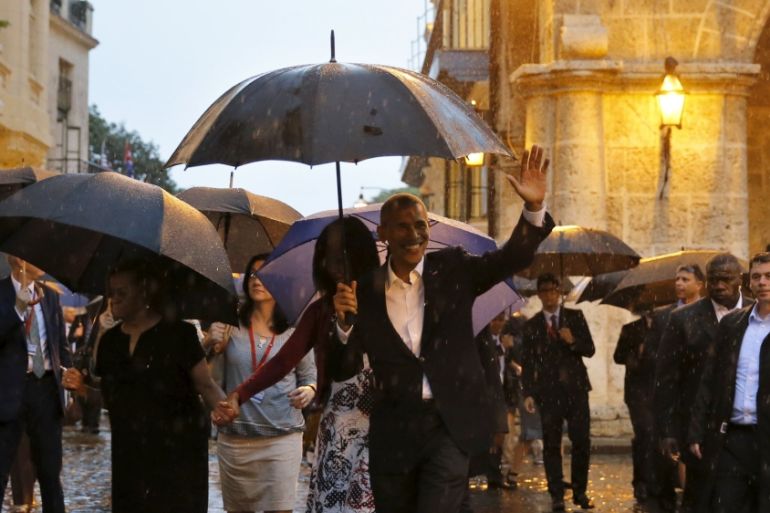Barack Obama: ‘Change going to happen’ in Cuba
But US president acknowledges “significant differences” on human rights and civil liberties amid one-party state rule.

US President Barack Obama said political change is inevitable on the communist island of Cuba as he met counterpart Raul Castro on Monday in Havana during a historic visit.
Obama, who arrived on the communist island a day earlier with his family, is the first US president to visit in 88 years, more than a year after he and Castro surprised the world in December 2014 by announcing that their countries would begin normalising relations.
Keep reading
list of 4 itemsUS to allow more flight routes to Cuba in latest restriction lift
Cuba has a new leader and it’s not a Castro
A new era in Cuba?
“Change is going to happen here and I think that Raul Castro understands that,” he said in an interview with US broadcaster ABC News.
Obama acknowledged, however, it was not going to occur “overnight”.
“But what we have seen is the reopening of the embassy and although we still have significant differences around human rights and individual liberties inside of Cuba, we felt that coming now would maximise our ability to prompt more change,” the president said.
READ MORE: Obama hails ‘historic’ opportunity on Cuba visit
But Obama admitted: “There’s no doubt that the Cuban government is still a one-party state that’s exerting control and that’s stifling dissent.”
The comments came a day after dozens of pro-democracy demonstrators were arrested during a protest before Obama’s arrival. They were held briefly before being released.
On Monday, Obama’s first stop on his first full day in Cuba was Revolutionary Square, home to a memorial to Cuba independence hero Jose Marti.
|
|
| Cuba eyes US market for expected medical tourism boom |
In a long-anticipated moment, Obama and Castro shook hands warmly and smiled for the cameras as they greeted each other.
The two countries have moved towards normalising relations after a breakdown following the 1959 communist revolution led by former Cuban President Fidel Castro.
Successive US governments have tried to oust the Cuban leadership, most notably during the CIA-backed Bay of Pigs invasion of 1961.
Obama also revealed on Monday that he plans to announce while in Cuba that tech giant Google has struck a deal to upgrade the paltry internet access on the island.
Newman said the Obamas’ visit had excited Cubans, many hopeful of what the newly re-established ties could bring.
“Many Cubans were actually saying they needed to pinch themselves, that they could not really believe that an American president was finally coming to their country,” she said.
“People want to know what the president is going to say … he will be addressing the Cuban people on Tuesday [and] this message will be broadcast live on Cuban television.”
READ MORE: Cuba’s combat rappers fight for the country’s youth
The main sticking point for bilateral relations is the devastating trade embargo imposed on Havana in 1962 by US President John F Kennedy. In the same year, the movement of nuclear missiles from the Soviet Union to Cuba brought the countries close to nuclear war.
Since the restoration of diplomatic relations, the states have signed hotel and telecommunication deals and put into place airline services. But obstacles remain, including the continuing trade embargo that only the US Congress can end.
|
|
| Cuban Americans divided over Obama’s Havana trip |